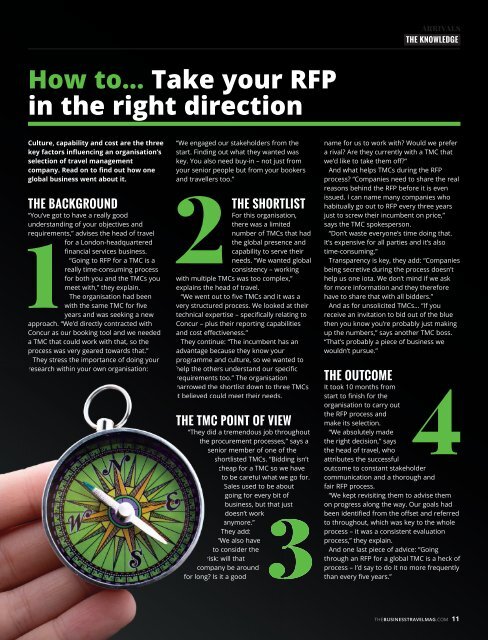You also want an ePaper? Increase the reach of your titles
YUMPU automatically turns print PDFs into web optimized ePapers that Google loves.
ARRIVALS<br />
THE KNOWLEDGE<br />
How to... Take your RFP<br />
in the right direction<br />
Culture, capability and cost are the three<br />
key factors influencing an organisation’s<br />
selection of travel management<br />
company. Read on to find out how one<br />
global business went about it.<br />
THE BACKGROUND<br />
“You’ve got to have a really good<br />
understanding of your objectives and<br />
requirements,” advises the head of travel<br />
for a London-headquartered<br />
financial services business.<br />
“Going to RFP for a TMC is a<br />
really time-consuming process<br />
for both you and the TMCs you<br />
meet with,” they explain.<br />
<strong>The</strong> organisation had been<br />
with the same TMC for five<br />
years and was seeking a new<br />
approach. “We’d directly contracted with<br />
Concur as our booking tool and we needed<br />
a TMC that could work with that, so the<br />
process was very geared towards that.”<br />
<strong>The</strong>y stress the importance of doing your<br />
research within your own organisation:<br />
“We engaged our stakeholders from the<br />
start. Finding out what they wanted was<br />
key. You also need buy-in – not just from<br />
your senior people but from your bookers<br />
and travellers too.”<br />
THE SHORTLIST<br />
For this organisation,<br />
there was a limited<br />
number of TMCs that had<br />
the global presence and<br />
capability to serve their<br />
needs. “We wanted global<br />
consistency – working<br />
with multiple TMCs was too complex,”<br />
explains the head of travel.<br />
“We went out to five TMCs and it was a<br />
very structured process. We looked at their<br />
technical expertise – specifically relating to<br />
Concur – plus their reporting capabilities<br />
and cost effectiveness.”<br />
<strong>The</strong>y continue: “<strong>The</strong> incumbent has an<br />
advantage because they know your<br />
programme and culture, so we wanted to<br />
help the others understand our specific<br />
requirements too.” <strong>The</strong> organisation<br />
narrowed the shortlist down to three TMCs<br />
it believed could meet their needs.<br />
THE TMC POINT OF VIEW<br />
“<strong>The</strong>y did a tremendous job throughout<br />
the procurement processes,” says a<br />
senior member of one of the<br />
shortlisted TMCs. “Bidding isn’t<br />
cheap for a TMC so we have<br />
to be careful what we go for.<br />
Sales used to be about<br />
going for every bit of<br />
business, but that just<br />
doesn’t work<br />
anymore.”<br />
<strong>The</strong>y add:<br />
“We also have<br />
to consider the<br />
risk: will that<br />
company be around<br />
for long? Is it a good<br />
name for us to work with? Would we prefer<br />
a rival? Are they currently with a TMC that<br />
we’d like to take them off?”<br />
And what helps TMCs during the RFP<br />
process? “Companies need to share the real<br />
reasons behind the RFP before it is even<br />
issued. I can name many companies who<br />
habitually go out to RFP every three years<br />
just to screw their incumbent on price,”<br />
says the TMC spokesperson.<br />
“Don’t waste everyone’s time doing that.<br />
It’s expensive for all parties and it’s also<br />
time-consuming.”<br />
Transparency is key, they add: “Companies<br />
being secretive during the process doesn’t<br />
help us one iota. We don’t mind if we ask<br />
for more information and they therefore<br />
have to share that with all bidders.”<br />
And as for unsolicited TMCs... “If you<br />
receive an invitation to bid out of the blue<br />
then you know you’re probably just making<br />
up the numbers,” says another TMC boss.<br />
“That’s probably a piece of business we<br />
wouldn’t pursue.”<br />
THE OUTCOME<br />
It took 10 months from<br />
start to finish for the<br />
organisation to carry out<br />
the RFP process and<br />
make its selection.<br />
“We absolutely made<br />
the right decision,” says<br />
the head of travel, who<br />
attributes the successful<br />
outcome to constant stakeholder<br />
communication and a thorough and<br />
fair RFP process.<br />
“We kept revisiting them to advise them<br />
on progress along the way. Our goals had<br />
been identified from the offset and referred<br />
to throughout, which was key to the whole<br />
process – it was a consistent evaluation<br />
process,” they explain.<br />
And one last piece of advice: “Going<br />
through an RFP for a global TMC is a heck of<br />
process – I’d say to do it no more frequently<br />
than every five years.”<br />
THEBUSINESSTRAVELMAG.COM<br />
11

















